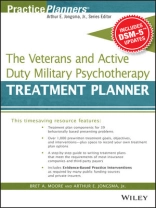This timesaving resource features:
* Treatment plan components for 39 behaviorally based presenting
problems
* Over 1, 000 prewritten treatment goals, objectives, and
interventions–plus space to record your own treatment plan
options
* A step-by-step guide to writing treatment plans that meet the
requirements of most insurance companies and third-party
payors
* Includes Evidence-Based Practice Interventions as
required by many public funding sources and private insurers
Practice Planners¯® THE BESTSELLING
TREATMENT PLANNING SYSTEM FOR MENTAL HEALTH PROFESSIONALS
The Veterans and Active Duty Military Psychotherapy Treatment
Planner provides all the elements necessary to quickly and
easily develop formal treatment plans that satisfy the demands of
HMOs, managed care companies, third-party payors, and state and
federal agencies.
* Features empirically supported, evidence-based treatment
interventions
* Organized around 39 main presenting problems in treating
veterans and active duty military personnel, including substance
abuse, adjustment to killing, anger management and domestic
violence, pre-deployment stress, survivors’ guilt, and combat and
operational stress reaction
* Over 1, 000 prewritten treatment goals, objectives, and
interventions–plus space to record your own treatment plan
options
* Easy-to-use reference format helps locate treatment plan
components by behavioral problem
* Designed to correspond with The Veterans and Active Duty
Military Psychotherapy Progress Notes Planner
* Includes a sample treatment plan that conforms to the
requirements of most third-party payors and accrediting agencies
including CARF, The Joint Commission (TJC), COA, and the NCQA
Additional resources in the
Practice Planners¯® series:
Progress Notes Planners contain complete, prewritten
progress notes for each presenting problem in the companion
Treatment Planners.
Homework Planners feature behaviorally based, ready-to-use
assignments to speed treatment and keep clients engaged between
sessions.
For more information on our
Practice Planners¯®, including our full line
of Treatment Planners, visit us on the Web at:
www.wiley.com/practiceplanners
Inhoudsopgave
Practice Planners Series Preface x
Acknowledgments xii
Introduction 1
Sample Treatment Plan 8
Adjustment to Killing 12
Adjustment to the Military Culture 19
Amputation, Loss of Mobility, Disfigurement 25
Anger Management and Domestic Violence 32
Antisocial Behavior in the Military 41
Anxiety 48
Attention and Concentration Deficits 57
Bereavement Due to the Loss of a Comrade 64
Borderline Personality 71
Brief Reactive Psychotic Episode 80
Chronic Pain after Injury 86
Combat and Operational Stress Reaction 92
Conflict with Comrades 99
Depression 106
Diversity Acceptance 114
Financial Difficulties 119
Homesickness/Loneliness 126
Insomnia 133
Mild Traumatic Brain Injury 139
Nightmares 146
Opioid Dependence 152
Panic/Agoraphobia 163
Parenting Problems Related to Deployment 172
Performance-Enhancing Supplement Use 178
Phobia 184
Physiological Stress Response-Acute 193
Post-Deployment Reintegration Problems 199
Posttraumatic Stress Disorder (PTSD) 206
Pre-Deployment Stress 216
Separation and Divorce 223
Sexual Assault by Another Service Member 232
Shift Work Sleep Disorder 238
Social Discomfort 244
Spiritual and Religious Issues 251
Substance Abuse/Dependence 257
Suicidal Ideation 268
Survivor’s Guilt 274
Tobacco Use 280
Appendix A: Bibliotherapy Suggestions 287
Appendix B: Professional References for Evidence-based
Chapters 304
Appendix C: Recovery Model Objectives and Interventions
317
Over de auteur
ARTHUR E. JONGSMA, JR.,
PHD, is the Series Editor for the bestselling
Practice Planners¯®. Since 1971, he has
provided professional mental health services to both inpatient and
outpatient clients. He was the founder and director of
Psychological Consultants, a group private practice in Grand
Rapids, Michigan, for 25 years. He is the author or coauthor of
over 50 books on treatment planning and has conducted training
workshops for mental health professionals around the world.
BRET A. MOORE, PSYD, ABPP, is a clinical
psychologist with the Indian Health Services, Fort Peck, Montana.
In 2008, he left Active Duty service in the U.S. Army where he
served as a captain and a clinical psychologist with the 85th
Combat Stress Control (CSC) unit based in Fort Hood, Texas. He has
extensive experience treating veterans, including two tours of duty
in Iraq as an Officer in Charge of Preventive Services and Officer
in Charge of Clinical Operations. He is coeditor of Living and
Surviving in Harm’s Way: A Psychological Treatment Handbook for
Pre-and Post-Deployment of Military Personnel.












